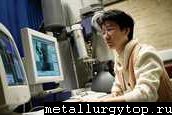What is Chemistry
 Chemistry is the science of substances, or materials, their composition and characteristics, and the reactions which take place between those substances. It is concerned with chemical elements in their pure state and when they are combined, that is, reactions of these elements and the compounds which they form. The scientist who wants to do chemistry must first be able to understand its building blocks, substances in their pure state. Only then can the chemist use that knowledge to comprehend more complicated phenomena, and begin to perform his own experiments.
Chemistry is the science of substances, or materials, their composition and characteristics, and the reactions which take place between those substances. It is concerned with chemical elements in their pure state and when they are combined, that is, reactions of these elements and the compounds which they form. The scientist who wants to do chemistry must first be able to understand its building blocks, substances in their pure state. Only then can the chemist use that knowledge to comprehend more complicated phenomena, and begin to perform his own experiments.
Every chemical reaction can be represented with the help of atoms and molecules. It was necessary, therefore, to develop a special system of chemical symbols. Substances in their pure state, called elements, were sometimes named after the scientists who discovered them. From those names, abbreviations were derived (like O for oxygen). These chemical symbols are used to denote various chemical reactions. Every element, then, has a letter or letters associated with it, most of these coming from the element's Latin name. It is natural that each element has its own original abbreviation.
With the help of these chemical symbols, which contain both letters and numbers, chemical reactions can be described in a way which describes the reality of what takes place at the atomic level. On one side, the left, are reactants, the substances which enter into a reaction. On the right side are products, the end results of a reaction.
Chemistry deals with reactions at the atomic level of substances. It attempts to experimentally decipher what happens between the individual atoms of a reaction, the «secret» of each reaction. In turn, these secrets help chemists formulate chemical laws and scientific information, which help them to better understand the world around us. One of the goals of chemistry is the development of new substances and materials, and their production. With the help of these new materials, those already in use can be replaced by more effective, higher quality ones, to make our lives easier and better.
In our daily lives, chemistry can be found around every corner. Without commercial fertiliser, medicines, plastics and other chemical products, it would be difficult to imagine our lives as they are today. We human beings have chemistry to thank for the tablets we take to make us feel better, for cleaning products, as well as for cosmetics and foods and other grocery products which contain preservatives to make them last longer.
Of course, what seemed to be promising chemical discoveries can also be the cause of environmental disasters. For example, DDT (dichlorophenyltrichloretane), an insecticide, or freon (composed of flourine and chlorine with hydrocarbons), and the dissolved gases in aerosol sprays and cooling fluids for refrigerators have all caused problems. When these problems arise, however, it is chemistry which has to step in to offer a solution.
A good example of this process, getting rid of harmful substances with the help of chemistry, was the development of a catalytic converter for motor vehicles. This device is simply an improvement to the exhaust system of motor vehicles. With its help, a highly poisonous gas, carbon monoxide (chemical symbol CO) is changed into the less harmful molecule carbon dioxide (chemical symbol CO2).
Chemistry's Beginnings
Many chemical reactions and procedures were being used long before human beings figured out that chemical laws actually governed their behaviour.
One example is the use of fire by early peoples as a source of light and heat: This is an oxidation reaction taking place.
The real beginnings of chemistry must be attributed to the developed cultures of times past. We can assume that the Egyptians, as well as the Chinese and ancient Greeks, were at the centre of the progress made in olden times. The inventions and discoveries made back then were often revolutionary, like the invention of gunpowder, which the Chinese discovered in the year 900 A.D. These discoveries often served to spark great progress in the field of natural sciences.
The ancient Greeks explained the nature of matter two different ways. Some claimed that all materials were made of four basic building blocks, or elements: air, water, earth and fire. Others believed that all materials were made up of incredibly minute particles, so–called atoms (Greek atomos = invisible). Chemistry as a science had first to be founded from a philosophical perspective. Only later could fields of study like metallurgy and alchemy be developed.
For a long period of time, alchemy concerned itself with the discovery of what was then known as the "philosophers' stone«. Alchemists attempted to turn simple metals, such as lead, into gold. This discipline came into being in the sixth century B.C. in Egypt. The word alchemy as such means "black element».
No documents exist that prove that the so–called philosophers' stone was ever discovered, but the amount and variety of experiments performed in the pursuit of changing metals to gold proved to be of great importance for the future of chemistry.
In the Middle Ages, chemistry began to have close ties with medicíne. Only a short time later, science began to be perceived as a series of factual and methodical processes, and old–style mythological beliefs slowly faded into the sunset. Antoine Lavoisier began the modern era of chemistry by proving the existence of «Oxygenia» through a combustion experiment.
The 18th century saw scientific progress accelerated in an unprecedented fashion. New elements were discovered. The foundations of both electrochemistry and organic chemistry were laid. And, scientists began to try to organise matter, or the elements, in a systematic way. In the end, it was Mendel and Meyer who found the answer in what is now known as the periodic table of the elements, which is in use to this day.
The discovery of molecular orbitals in the 20th century helped to explain covalent bonding. Thanks to that discovery, more and more synthetic products (artificially produced) were developed. In addition, one of the most revolutionary discoveries of recent history was the «untangling» of the structure of the DNA molecule, the building block of all organic matter.
Of course, chemistry is not a closed system, unrelated to others. It is only one segment of the spectrum of natural sciences, all of which are in constant flux, changing and being modified constantly.





What is Chemistry?
 Put it simply Chemistry is the study of matter and the way matter changes.
Put it simply Chemistry is the study of matter and the way matter changes.
The word Chemistry comes from an ancient Egyptian word khemeia. Khemeia was an Egyptian art which occurs in various Egyptian groups that was connected to mummification. Later along the history, its practices included things such as dyeing, metallurgy and glass making.
Although the ancients knew of copper, silver, gold, tin, lead, iron, carbon and sulphur, they did not know that these are elements. To them, they follow the teachings of the 5th century BC Greek thinker and philosopher Empedocles and popularized by Aristotle. To them, matter was made up of four elements – the earth, air, fire and water. To them this classification made sense because after all, earth is not a solid, water is not a liquid, air not a gas and fire not an energy. Of course, to use people that study «Science» and call ourselves Scientists, that sentence does not make sense to us.
When Greek thinking encountered the Egyptian art of khemeia, probably during Alexandria about 300 BC, alchemy was born and it flourished for two thousand years. Alchemy combined mysticism and many general scientific experimentation. The alchemists became obsessed with the search of immortality and trying to turn any kind of metals into gold. They were the first to make general use of many of the chemicals we use today, such as strong acids – sulphuric acid, hydrochloric acid and nitric acid. They also developed many experimental procedure such as filtration, dissolution of solids and simple distillation.
The alchemists had built up a list of practical scientific information but they did not understand why things happened. Before our current understanding of chemistry, there are 3 more important concepts that were developed and followed:
- Appreciation that scientific progress begins always with experiments and onservations
- An understanding of what an element is – Robert Boyle and Antoine Lavoisier concluded the elements are the simplest unit that cannot be further broken down.
- Development of the Atomic Theory – Greek philosopher Leucippus and Democritus proposed about this theory but was not successful. John Dalton is the one that came in to prove its existence.
And with that, the Russian Dmitri Mendeleev (1834 – 1907) came in to construct the world famous The Periodic Table which are recognised as the most important system of classification in Chemistry.
Many people talked about teaching Chemistry, Sean Chua Lian Heng lives it. He is a passionate Chemistry Coach based in Singapore, Southeast–Asia and one of the most dynamic, powerful and humorous speakers in Asia. He has empowered hundreds of students to experience Chemistry learning with a difference, and unlock the secrets to achieve the grades they truly deserve.
He specialized in helping students through The 1ST in Singapore GCE 'O' Level Chemistry Intensive BootCamp and Organic Chemistry Mastery Workshop using Accelerated Learning Techniques. His 10 years of coaching experience has equipped him to understand the true reasons why students are not able to perform well in Chemistry, and has allowed him to structure his teaching methodology to cater to different levels of learners. Sean has produced many outstanding students who have achieved marvelous 'O' Level Chemistry results under his wings of patient guidance and coaching.
His chemistry coaching methodology emphasizes on the vital 4 'A's and has a 100% proven track record to help students to improve their chemistry grades:
• Associations with Everyday Life
• Applications in Real Life & Industrial Examples
• Analogies for abstract Chemistry Theories
• Accelerated Learning Techniques
Having acquired knowledge in the different fields of Chemistry during his Polytechnic and University days Sean is able to communicate experiences, real life Chemistry observations, apt analogies – all this to simplify the Chemistry Concepts for students to grasp and remember in an easier manner. He also has several years of experience as a Chemist and Technical Specialist for the fast–growing Research Chemical Industry. Through his extensive experiences in the Chemical Research arena, he is constantly talking to aspiring scientists, researchers as well as Deans, educators in local universities and schools – such updated research and market trends are always the highlights when students asked about how each Chemistry topics relate to real life situations.





Santorini - Bronze Age (3200-1100 BC)
 The early Bronze Age in the Aegean, also known as the Early Cycladic period, is divided into sub–periods, corresponding primarily to the advances in pottery techniques and design.
The early Bronze Age in the Aegean, also known as the Early Cycladic period, is divided into sub–periods, corresponding primarily to the advances in pottery techniques and design.
By the first period of the Bronze Age (Halcolithic Age), the Cyclades had already developed a culture with its own distinct features.
The expansion of shipping and trade between 2800–2700 BC generated the growth of ports, which became small urban centers. Besides Phylakopi on Milos, other centers were Akrotiri on Santorini, Aghia lrin on Kea, Parikia on Paros, and so on. Fortified settlements also appeared, such as at Kastri on Syros, Panormos on Naxos, Kynthos on Delos, Halandriani on Syros, and so far on.
But these settlements did not last long and came to violent ends. As a result, artistic creation in the Aegean was suspended and the settlements did not evolve into city–states.
After 2000 BC, Minoan civilization made inroads into the Cyclades. This infiltration affected not only pottery making, architecture and metallurgy, but also writing, religion and systems of measurement.
The eruption of the Santorini volcano, in c. 1 650 BC, made an impact on developments in the Aegean. Here was initial period of decline after the eruption, but a revival soon followed.
The settlement of Phylakopi on Milos (Phylakopi III) was rebuilt on top of the ruins of Phylahopi II. Evidence shows that during this period the Cyclades invaded by the same peoples, mostly from mainland Greece, who had invaded Crete alter the eruption of the Santorini volcano. Phylakopi Ill was destroyed and Phylakopi IV became a fortified Settlement. Minoan Crete, like the Cyclades, was strongly influenced by Mycenaean civilization.
Because of their geographic position, the Cyclades, in particular, became a bridge for Mycenaean trade activities.
The Mycenaeans took advantage of the islanders' shipbuilding knowledge and sailing experience which resulted in further growth of the Cyclades during the late Bronze Age.




